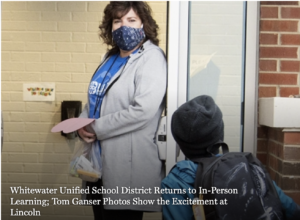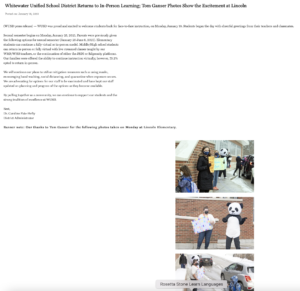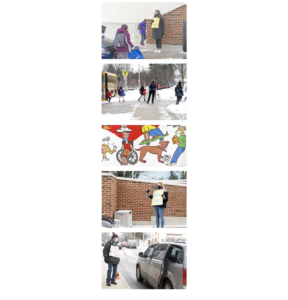 The Whitewater Unified School District’s board will see a contested February primary and a contested April general election. Regrettably, Whitewater has no professional newspaper, print or electronic, to cover that race. A post from today at the Whitewater Banner, entitled “Whitewater Unified School District Returns to In-Person Learning; Tom Ganser Photos Show the Excitement at Lincoln,” is an example of what Whitewater lacks (link at https://whitewaterbanner.com/whitewater-unified-school-district-returns-to-in-person-learning-tom-ganser-photos-show-the-excitement-at-lincoln/, screenshots below).
The Whitewater Unified School District’s board will see a contested February primary and a contested April general election. Regrettably, Whitewater has no professional newspaper, print or electronic, to cover that race. A post from today at the Whitewater Banner, entitled “Whitewater Unified School District Returns to In-Person Learning; Tom Ganser Photos Show the Excitement at Lincoln,” is an example of what Whitewater lacks (link at https://whitewaterbanner.com/whitewater-unified-school-district-returns-to-in-person-learning-tom-ganser-photos-show-the-excitement-at-lincoln/, screenshots below).
Of course, people – especially children – should be happy & excited. One hopes children do, and always will, enjoy school. Being back with one’s teachers and friends is understandably important. A publication, however, is not a child, a teacher, or a school – it’s a mere presentation of children, teachers, or schools, and so is responsible for the manner of that presentation.
Some years ago, a local politician began publishing the Banner, a website styled as an online newspaper. The publication is now the property of a local charity (the Whitewater Community Foundation) but has among its editors the current president of the Whitewater Common Council and a candidate for that same public body.
Needless to say, there are no self-described staff writers, reporters, or editors (paid or volunteer) who are also politicians and candidates. None. Indeed, in the entire state (population 5.8 million) there is no other publication, to my knowledge, that presents itself as a news site while politicians, public-body appointed officials, or candidates are editors.
The post in the Banner about the re-opening of our public schools to face-to-face instruction combines a press release of 1.18.21 from the district administrator and photographs from an incumbent school board candidate. The mixture is littered with conflicts or omissions.
The post does not identify the photographer as a member of the school board.
The post does not identify the photographer as a candidate for re-election.
The combination of the district administrator’s press release and the candidate’s photos will invite some readers to wonder if there has been coordination between the appointed administrator and the incumbent candidate.
(N.B.: There is no evidence whatever that the district administrator is responsible for this combined, disclosure-free post. The Banner has done the district administrator no favors. Other than a flop house or a Greyhound Bus terminal, there are few worse places for an administrator to be than in the middle of Whitewater’s school board race.)
The photos are more an incumbent’s campaign ad than news, with the incumbent-candidate board member taking pictures of district employees with welcoming signs, a gesticulating panda mascot, and children’s art.
(A mural, with dogs in masks or a wheelchair, is endearing; it deserves better than inclusion in this admixture.)
I’ve no favored candidates in this race, no preference for anyone, and so no one to endorse. It’s almost certain that some candidates will prove preferable to others. (That’s an understatement.) In any event, the primary is weeks away, and there are weeks more afterward until the April general election; there is time for one to examine candidates’ positions and write as warranted.
Regardless, there are principles at a stake as important as winning a race. Anyone who grew up in a time of strong journalism, from a newspaper-loving family, would see that the Banner’s post isn’t journalism. FREE WHITEWATER is a site of commentary; I’m not and have never wanted to be a journalist. It would be better for this community to create a proper journalistic enterprise or admit that it has none.
Whitewater is, sadly, a news desert. The improvement of a desert, however, is not a mirage, but an oasis of (of definite standards and characteristics).
(Click for Larger Images.)




This is the standard position for journalism, no politicians as reporters.It’s so standard that Whitewater is a distant outlier.That’s true. Most of the faculty live in towns with regular newspapers. They all know what blogs are but no one has this hybrid newspaper concept.
You have had this view for as long as I can remember.Credit to you.They want to gather news but they also make the news.They want to fill a gap.If they only posted press releases no one would worry.If they gave opinions no one would worry, either.It’s that they blur the line a lot.Righties in town think it’s biased but the problem is more not knowing how to be a paper.
A view advancing only a consequence isn’t a view as much as a preference. A position may yet be right even if disfavored candidates benefit from it. It doesn’t matter what conservatives in town think of the Banner, blogging, or journalism. It matters what they think of Fitzgerald and Trump. As one knows what they think of Fitzgerald and Trump, one’s opinion of their judgment is nearly settled.
In a small town like Whitewater – beautiful but not easy – it’s hard to hold a line, come what may. People naturally want community, but on what terms?
Whitewater will have a better community through better terms.
C.O.N.T.R.O.L.
There’s another way to look at this: not as too much of something, but as too little of something else. I’d say it’s not a desire to produce a controlling external result as it is a lack of editorial guidelines to produce a controlling internal standard. For example: when it’s this topic, check these six items in a post before publication, when it’s that topic, check these five items, etc. That’s not a comprehensive explanation of editing (of course), or editorial standards (obviously), but would be a step toward a regulating editorial policy.
There’s proofreading, editing, and authorship, as separate roles. Proofreading is necessary (but relatively simple) as against editorial decisions of inclusion, exclusion, tone, and explanation (at a minimum). Editing is an exercise of judgment guided by principle and (at its best) of artistry (‘how will one say this?’).
Push on a bit from mere publication – not impossibly far, really – and one would find a collection of applied standards that would exercise more control over content while freeing from a publication concern over questions about content.
Easiest contention of all? News (professional or citizen) is harder in ways different from commentary (as here at FW), but this community benefits from both.